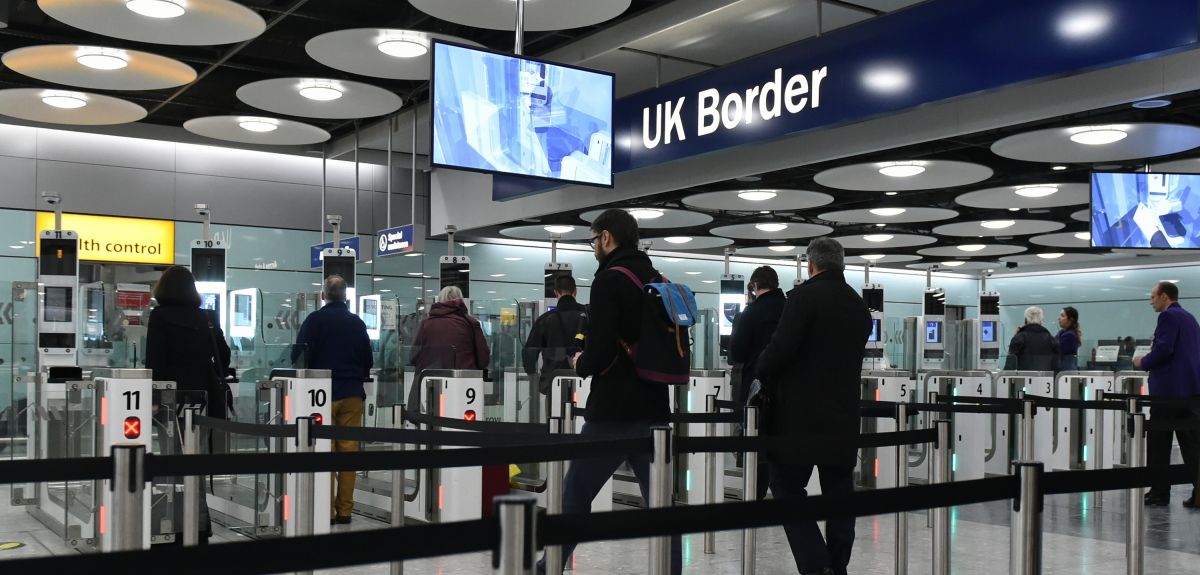
Image credit: Border passport control at Heathrow courtesy of Shutterstock.
Young EU migrants more likely to be in work than their UK peers
Young migrants from EU countries have higher employment rates and are less likely to seek jobseeker's allowance than their UK peers, according to study by the Department of Social Policy and Intervention.
Dr Thees Spreckelsen and Professor Martin Seeleib-Kaiser analysed UK Quarterly Labour Force survey data between 2010 and 2014 and found that migrants from central and eastern Europe (defined as those from the Czech Republic, Estonia, Hungary, Latvia, Poland, Slovakia and Slovenia) scored the highest, with 82% of them in employment compared with 73% of young people born in the UK.
Workers born in the UK did an average 40-hour working week, but most EU migrants did at least an hour more, according the data analysis. It also reveals that while 8.5% of those born in the UK were unemployed in the period studied, just five per cent of those from central and eastern Europe said they had been without a job during that time in the UK.
The researchers found that migrants from central and eastern Europe are much more likely than UK nationals to go into manufacturing, while young people from Bulgaria and Romania – classified as a separate group by the researchers – are more likely than any other group to work in construction and as likely to work in financial services as UK youths.
Young EU migrant citizens work long hours, often at lower pay and worse conditions than UK youth, despite the fact that many of them are highly qualified.
Dr Thees Spreckelsen, Department of Social Policy and Intervention
Recent young European migrant workers from central and eastern Europe, and Bulgaria and Romania, are often overqualified for the jobs they are working in. However, young migrants from the rest of the EU and outside Europe did better than expected in the jobs they secured when matched with the median for qualifications held by others in the same occupation.
The researchers also note that young migrants from central and eastern Europe, and Bulgaria and Romania, were found to be paid around one-fifth less, on average, than their UK peers in gross hourly wages. Meanwhile, other migrants did much better: those from southern Europe got comparable rates to UK peers while the remainder did better than UK peers with higher hourly wages, on average.
Irrespective of their country of origin, about 60% of all migrants who had arrived in the UK in last five years and had lived here for at least one year were in the 20-34 age bracket, says the study. It finds that the proportion of young migrants coming here from central and eastern Europe has dropped by 10 percentage points since the economic crisis of 2008. More females than males are now arriving from central and eastern European countries, reversing the trend before 2010.
To date, little research has been done into how young migrants from across EU countries fare in the labour market in the UK. Previous studies have compared much smaller groups of countries with migrants from non-EU countries or specific ethnic groups. Commenting on the findings from their working paper, Dr Spreckelsen says: 'Young EU migrant citizens work long hours, often at lower pay and worse conditions than UK youth, despite the fact that many of them are highly qualified.'
Professor Seeleib-Kaiser adds: 'Contrary to the widespread image of "poverty migrants", a significant proportion of EU migrant citizens from Bulgaria and Romania are employed in high-skilled jobs and overall many young EU migrant citizens fill skill gaps in the UK economy.'
The research leading to these results has received funding from the European Union’s Seventh Framework Programme for research, technological development and demonstration.
 Statins do not cause the majority of side effects listed in package leaflets
Statins do not cause the majority of side effects listed in package leaflets